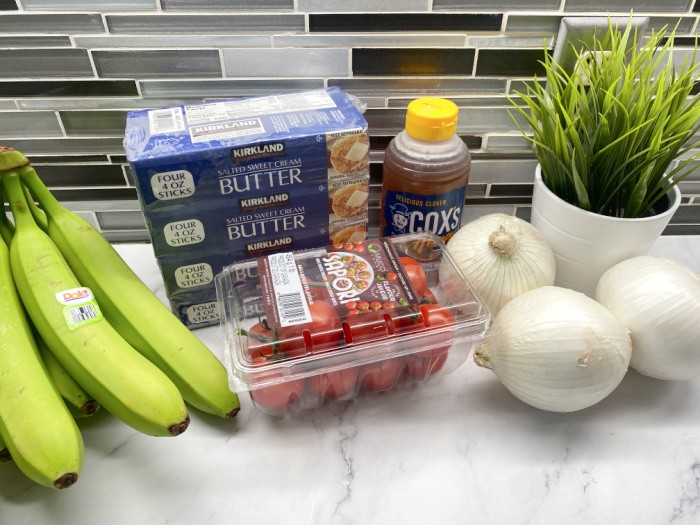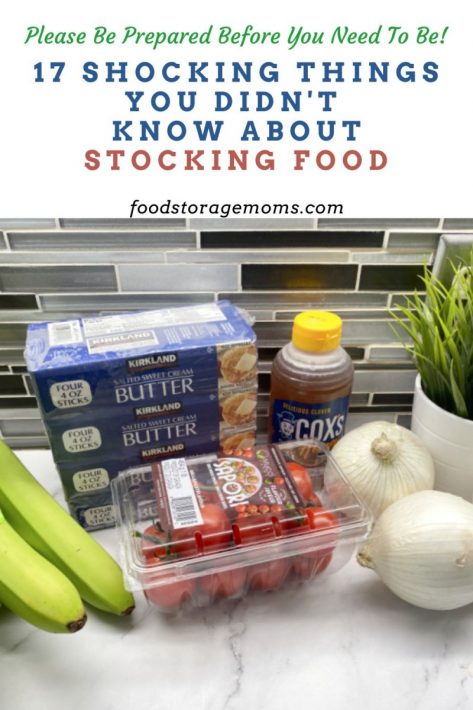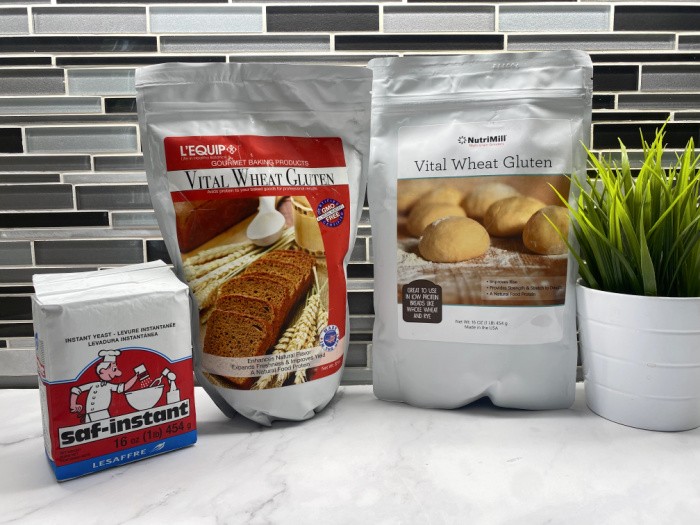
If you’re like most people, you probably think of stocking up on food as just getting a few extra cans of soup and some boxes of cereal. But there’s more to it than that if you want to feel prepared for emergencies. Here are 17 shocking things you didn’t know about stocking food.
In the next 30-40 days, I want to stress getting food and water stocked. Please only buy what your family will eat. Take your family to the grocery store and have them choose things they want to eat for breakfast, lunch, and dinner in non-perishable containers. If you haven’t used my “chart,” now is the time. Please give one of these to each family member and have them fill in the blanks. Where Do I Start
Stocking Food
When we talk about “stocking food,” we mean having a supply of non-perishable items and foods with a longer shelf life in an emergency. This could be anything from a natural disaster to a power outage. In either case, having a stockpile of food that doesn’t require refrigeration or cooking to make it fit for consumption can be a lifesaver.
But stocking food isn’t just about survival; it’s also about being prepared for unexpected situations. For example, let’s say you have a big project due at work and know you won’t have time to go to the grocery store. Or maybe you’re snowed in and can’t get to the store. In either case, having a stash of easy-to-prepare food can help you avoid unhealthy (and expensive) takeout options.
So, what does it mean to stock food? It means being prepared for anything life throws your way. And that’s always a good thing.

17 Things You Didn’t Know About Stocking Food
You may know that you should be stocking food and supplies for emergencies, but here are a few things you may not know!
1. Keep Ripe Bananas Cold
Let your bananas sit at room temperature until they are ripe with plenty of spots. Then, plop them in the refrigerator. You can get an extra week out of them this way.
2. You Can Freeze Nuts
You may not know this, but you can freeze most nut varieties! This includes peanuts, cashews, pistachios, and more. Just make sure to thaw them before eating them. I believe nuts can be stored in the freezer for several months or years.
3. Butter will Last Longer if it’s Stored in the Freezer
If you desire some butter but don’t want it to go bad, store it in the freezer! Butter can last up to a year when stored this way. Just make sure to thaw it out before using it.
4. You Can Get Bread in a Can
I didn’t know this, but you can get bread in a can. Who knew? You can snatch up B&M Brown Bread right on Amazon. Canned bread can be stored for up to two years.
5. There are MREs for Dogs
Did you know that there are MREs (Meals Ready to Eat) for dogs? K9 Natural Dog Food makes them and can be stored for up to two years. They even have a shelf life of up to seven years if stored in a cool, dry place.
6. You Can Store Honey Forever
Honey is one of those magical foods that never goes bad. You can store it forever, and it will still be just as delicious as the day you put it away. Just be sure to place the honey in glass jars so that when it crystallizes, you can place it outside in the sun to hopefully bring it back to normal consistency. Or you can place the jars in a pan filled with warm water to liquefy the honey.
7. You Shouldn’t Store Tomatoes in the Fridge
It would be best if you didn’t store tomatoes in the fridge despite what you may have been told. The cold temperature ruins the flavor. Keep them on the counter instead.
8. You Can Store Cheese in the Freezer
Cheese can be stored in the freezer for up to two months. Just make sure to wrap it tightly so that it doesn’t dry out. I don’t freeze whole chunks of cheese; they crumble too much. I freeze shredded Mozzarella, cheddar, and the Mexican blend shredded cheese.
9. Unusual Berries Come in Cans
You can find canned unusual berries at your local grocery store. These include gooseberries, huckleberries, and more. They can last for up to two years in the pantry.
10. Pumpkins Last Longer Than You Think
Pumpkins are pretty durable. They can last up to three months if stored in a cool, dry place.
11. You Shouldn’t Store Garlic in the Fridge
It would be best if you didn’t store garlic in the fridge, despite what you may have heard. The moisture will cause it to mold. Instead, please keep it in a cool, dry place.
12. You Can Freeze Your Yeast, Wheat Gluten, and Dough Enhancer
Yes, you can freeze your Saf Instant yeast, Wheat Gluten, and Dough Enhancer in the original bags or transfer the open bags to an airtight container for the freezer. Here’s the deal with dough enhancers and wheat gluten: they make your bread dough fluffy, soft, and have the best texture ever!
I only learned to use them when I taught at a Bosch store about 15-16 years ago. They are optional; you don’t need to use them, but I do almost every time I make homemade bread. When I was growing up, my mother made hard red wheat bread similar to “bricks.” We loved it but didn’t know we could have soft wheat bread.
Please note that I only buy hard white wheat for my bread making. Hard red wheat has more protein, but the flavor is more potent. It’s all about personal preference.

13. You Shouldn’t Store Onions in the Fridge
It would be best if you didn’t store onions in the fridge, despite what you may have heard. The moisture will cause them to mold, much like garlic. Instead, please keep them in a cool, dry place.
14. Low Carb Pasta Comes in a Can
If you’re looking for a low-carb pasta option, you can find it in a can or a package. Palmini is one brand that makes it. You can get lasagna, linguine, and spaghetti.
15. You Can Store Milk in the Freezer
Milk can be stored in the freezer for up to six months. Just make sure to thaw it out in the refrigerator before using it. You may need to put it in a larger container since liquids expand when frozen.
16. You Can Store Flour in the Freezer
Flour can be stored in the freezer for up to six months. This wouldn’t work because I buy 200 pounds of flour at a time. But, if you buy smaller 5-pound bags, keep the flour in an airtight container before placing it in the freezer for extended periods.
17. Get Dolmas in a Can
Dolmas are grapevine leaves filled with rice, onion, and herbs and rolled into little bundles of deliciousness. Many people enjoy them as appetizers at Mediterranean restaurants, but now you can enjoy them at home.
What Canned Foods Should I Stock?
It would be best if you were stocking food with lots of variety. You want fruits, vegetables, meat, grains, dairy, etc. The best way to do this is to create a list of all the food you eat in a week and then buy those items in canned form. This will help you make sure you have a well-rounded selection.
There are many great canned foods that you may not have known about. Now, be sure to stock up so you’re prepared for anything.
What Fresh Foods Can Be Stored Long-Term?
There are quite a few fresh foods that can be stored long-term. These include potatoes, onions, garlic, carrots, and apples. Just make sure to store them in a cool, dry place.
More About Stocking Food:
- 7 Reasons Why Stocking Food Is Popular
- 15 Facts About Food That Will Blow Your Mind
- 10 Awesome Facts About Canned Food
- 11 Emergency Foods That You Need
Final Thoughts
Stocking food is essential for preparing it in case of an emergency. But it’s also important to know what foods can be stored long-term and how to store them best. Did you know all of these things about stocking food? I sure didn’t! But now I do, and I’m better prepared for an emergency. What are some other things you didn’t know about stocking food? Let me know in the comments below! May God bless this world. Linda
The post 17 Shocking Things You Didn’t Know About Stocking Food appeared first on Food Storage Moms.
from Food Storage Moms
No comments:
Post a Comment